Meretz
Meretz (Hebrew: מֶרֶצ, lit. "Vigour")[15] is a left-wing, social-democratic and green political party in Israel. The party was originally formed in 1992 by the merger of Ratz, Mapam and Shinui, and was at its peak between 1992 and 1996 when it had 12 seats. It is currently has three seats in the Knesset.
Meretz מרצ | |
|---|---|
 | |
| Leader | Nitzan Horowitz |
| Founded | 1992 (alliance) 1997 (single party) |
| Merger of | Ratz, Mapam, Shinui |
| Headquarters | Tel Aviv |
| Youth wing | Meretz Youth |
| Ideology | Social democracy[1][2] Secularism[3][4] Feminism[5] Progressivism[5] Egalitarianism[6] Green politics[7] Two-state solution[8] Labor Zionism[9] |
| Political position | Left-wing[10][11] |
| National affiliation | Democratic Union (2019–20) |
| European affiliation | Party of European Socialists (observer)[12] |
| International affiliation | Progressive Alliance[13] Socialist International[14] |
| Colours | Green |
| Knesset | 3 / 120 |
| Most MKs | 12 (1992–1996) |
| Election symbol | |
| מרצ | |
| Website | |
| www | |
Meretz is a secular party emphasising a two-state solution to the Israeli–Palestinian conflict, social justice, human rights (especially for religious, ethnic and sexual minorities), religious freedom and environmentalism.[16] The party is a member of the Progressive Alliance and Socialist International, and is an observer member of the Party of European Socialists.
History
.png)
Meretz was formed prior to the 1992 Israeli legislative election by an alliance of three left-wing political parties, Ratz, Mapam and Shinui, and was initially led by Ratz's chairwoman and long-time Knesset member Shulamit Aloni. The name "Meretz" (מרצ) was chosen as an acronym for Mapam (מפ"ם) and Ratz (רצ). The third party of the alliance wasn't reflected in its name, but was instead mentioned in the party's campaign slogan: "ממשלה עם מרצ, הכוח לעשות את השינוי" (A government with vigor [Meretz], the strength to make the change [Shinui]). Its first electoral test was a success, with the party winning twelve seats, making it the third-largest in the Knesset. Meretz became the major coalition partner of Yitzhak Rabin's Labor Party, helping pave the way for the Oslo Accords. The party also picked up several ministerial portfolios; Aloni was made Minister of Education, though disputes over the role of religion in education meant she was moved out of the education ministry to become Minister Without Portfolio in May 1993. In June 1993, she became Minister of Communications and Minister of Science and Technology, a role that was later renamed Minister of Science and the Arts. Amnon Rubinstein became Minister of Energy and Infrastructure and Minister of Science and Technology, and later Minister of Education, Culture and Sport, whilst Yossi Sarid was named Minister of the Environment and Yair Tzaban was named Minister of Immigrant Absorption.
After the 1996 elections, in which Meretz lost a quarter of its seats, Aloni lost internal leadership elections to Yossi Sarid and retired. In 1997, the three parties officially merged into a single entity, though part of Shinui (under the leadership of Avraham Poraz) broke away to form a separate movement. Later in the Knesset session, David Zucker also left the party to sit as an independent MK.
1999–2009
The 1999 elections saw the party regain some of its former strength, picking up 10 seats, including the first-ever female Israeli Arab MK, Hussniya Jabara. Meretz were invited into Ehud Barak's coalition, with Sarid becoming Education Minister, Ran Cohen Minister of Industry and Trade and Haim Oron Minister of Agriculture and Rural Development. However, after Likud leader Ariel Sharon beat Barak in a special Prime Ministerial election in 2001, Meretz left the government.
On 22 October 2002, Meretz MK Uzi Even made history by becoming the first openly gay Member of Knesset, after Amnon Rubinstein retired. This created a vacancy and Even was next on the Meretz list. His term lasted less than three months, however, as the Knesset was dissolved in January 2003. Even's entry to the Knesset was met by mixed reactions from the ultra-Orthodox parties; Shas's Nissim Ze'ev was the harshest, saying Even "symbolized the bestialization of humanity", adding that he should be "hidden under the carpet" and banned from entering the Knesset.[17]
For the 2003 elections, Meretz were joined by Roman Bronfman's Democratic Choice. However, the party shrank in representation again, this time to just six seats. Sarid immediately took responsibility and resigned from leadership, though he did not retire from the Knesset and continued serving as an MK, before stepping down prior to the 2006 elections.
In December 2003, Meretz was disbanded, in order to merge with Yossi Beilin's non-parliamentary Shahar (שח"ר) movement. The original name suggested for the new party was Ya'ad (יעד, Goal), but was not used because it sounded like the Russian word for poison ("yad"), and it was feared that it might alienate Israel's one million Russian-speaking voters (although there had been two parties previously in Israel using the name – Ya'ad and Ya'ad – Civil Rights Movement, the latter ironically a forerunner of Meretz, they both existed before large-scale immigration from the Soviet Union). Instead, the name Yachad (Hebrew: יח"ד) was chosen. As well as meaning "Together", it is also a Hebrew acronym for Social-Democratic Israel (Hebrew: ישראל חברתית דמוקרטית, Yisrael Hevratit Demokratit).
The new party was established in order to unite and resuscitate the Israeli Zionist peace camp, which had been soundly defeated in the 2003 elections (dropping from 56 Knesset members in 1992 to 24 in 2003) following the Al-Aqsa Intifada. The party's purpose was to unite a variety of dovish Zionist movements with the dovish wing of the Labor Party. However, the efforts were largely unsuccessful as, except for the original Meretz, Shahar and Democratic Choice, no other movement joined the new party. It has suffered from declining popular interest in left-wing peace movements, as a result of the rise in Palestinian violence, and only 20,000 people are now registered members of the party, half the number who were prior to the 1999 party primaries.
In March 2004, Yossi Beilin was elected party leader, beating Ran Cohen, and started a two-year term as the first chairman of Yachad. In July 2005, the party decided to change its name to Meretz-Yachad, because opinion polls revealed that the name Yachad was not recognisable to the Israeli public and that they preferred the old name Meretz. The chairman Beilin opposed the motion to revert the name to Meretz and a compromise between the old and new names, Meretz-Yachad, was agreed upon.
However, in the 2006 election campaign, the party dropped the Yachad part of its name, running as just Meretz, under the slogan "Meretz on the left, the Human in the centre". Nevertheless, it failed to stop the party's decline, as they won just five seats. In 2007, Tsvia Greenfeld, sixth on the party list, became the first-ever female ultra-Orthodox Knesset member, following Yossi Beilin's decision to retire from politics.
In March 2008, internal elections for the chairman of the party were held. At an early stage, Yossi Beilin, Zehava Gal-On and Ran Cohen announced their bids. After Haim Oron announced his bid in December 2007, Beilin withdrew his bid and announced his support for him. Oron went on to win the internal elections held on 18 March 2008 with 54.5% of the vote, beating Ran Cohen (27.1%) and Zehava Gal-On (18.1%) to become Meretz's new chairman.[18]
On 22 December 2008, Meretz finalized its merger with Hatnua HaHadasha ("The New Movement") for the 2009 Israeli elections.[19]
2009–present
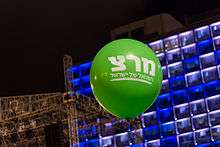
The joint Meretz–Hatnua HaHadasha list ended up winning only 3 seats in the election. This electoral loss was largely attributed to traditionally left-wing voters choosing to strategically vote for Kadima, in an effort to get Tzipi Livni to head the next government, instead of Benjamin Netanyahu of Likud.[20]
Following the party's failure in the 2009 legislative elections,[21] some of the party members called for the resignation of the party chairman Haim Oron and to give way for Zehava Gal-On. Haim Oron indeed left the Knesset on 23 March 2011[22] and later left the chairmanship of the party. As a result, MKs Zehava Gal-On, Ilan Gilon, and youth activist Ori Ophir began campaigning to win the position of the party chairman.[23] The primaries were held on 7 February 2012 for the position of the party's chairman; Gal-On was elected as the chairman with 60.6% of the votes, whilst Ilan Gilon was second with 36.6%, and Uri Ofir was third with 2.8%.
In the 2013 legislative election Meretz received 4.5% of the national vote, winning six seats.[24]
On 8 December 2014, Meretz signed a surplus-vote agreement with the Labor Party for the upcoming 2015 legislative election,[25] the latter set to contest the election as the Zionist Union. On 19 January 2015, Meretz held its primaries at a meeting of its 1,000-member central committee in the Tel Aviv Convention Center: Zehava Gal-On was re-elected party leader, whilst MK Nitzan Horowitz chose not to stand for re-election.[26]
In 2015, as preliminary results of the Knesset elections indicated that the party representation would be reduced, Zehava Gal-On announced that she would resign as chairperson of Meretz as soon as a successor was chosen, and from the Knesset, in order to open a place for Tamar Zandberg, the party's fifth place-candidate who appeared to have lost her seat. Zandberg, Ilan Gilon, and others urged Gal-On to reconsider her decision.[27] However, once absentee and soldier ballots were counted, Meretz gained a fifth seat, negating the premise for Gal-On's earlier announcement,[28] and she announced that she would continue as party leader,[29] saying: "Meretz received a fifth seat from young supporters, from Israeli soldiers, who raised the party's rate of support. That allowed Meretz to maintain its strength in terms of the number of voters – some 170,000 – compared with the last election. Under the circumstances, and against all odds, that is a success."[30]
Tamar Zandberg became the leader of Meretz in 2018. In February 2019, Meretz held its first-ever open primary contest. Eighty-six percent of party members cast votes. Ilan Gilon won first place; he will be placed second on the party's Knesset slate, behind party leader Tamar Zandberg. Michal Rozin came in second place, followed by Issawi Frej and Ali Shalalha.[31] In the April 2019 elections, the party won four seats.
In July 2019 Meretz agreed to form an electoral union with Ehud Barak's Israel Democratic Party and breakaway Labor MK Stav Shaffir for the September elections,[32] a decision ratified on 29 July.[33] The alliance won five seats, three of them going to Meretz. Prior to the March 2020 elections, the party joined an alliance with Labor and Gesher, which won seven seats, three of them held by Meretz.
Ideology
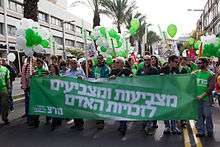
Meretz defines itself as a left-wing, social-democratic party. It sees itself as the political representative of the Israeli Peace movement in the Knesset – as well as municipal councils and other local political bodies.
In addition to being a full member of Socialist International and the Progressive Alliance, it has participated in Global Greens conferences.[34]
In the international media, Meretz has been described as left-wing, far-left, social-democratic, dovish, secular, civil libertarian and anti-occupation.[35][36][37][38][39][40]
Stated principles
The party emphasises the following principles (not necessarily in order of importance):
- Peace between Israel and the Palestinians, based on a two-state solution, as laid out in the Geneva Accord.
- Freezing construction of the Israeli settlements in the West Bank.
- Human rights issues:
- Struggle for the protection of human rights in the Israeli-occupied territories.
- Rights of minorities in Israel (such as Israeli Arabs and foreign workers), fight against discrimination and support for affirmative action.
- Egalitarianism.[6]
- LGBT rights.
- Struggle for social justice:
- Making Israel a social-democratic welfare state.
- Protecting workers' rights and fighting against their exploitation (especially, though not exclusively, in the case of foreign workers and immigrants).
- Separation of religion and state and religious freedom.
- Liberal education.
- Israel's security.
- Environmentalism.
Leaders
| Leader | Took office | Left office | ||
|---|---|---|---|---|
| 1 | 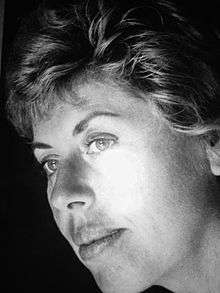 |
Shulamit Aloni | 1992 | 1996 |
| 2 | Yossi Sarid | 1996 | 2003 | |
| 3 | 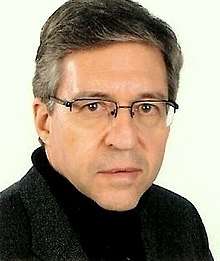 |
Yossi Beilin | 2003 | 2008 |
| 4 | 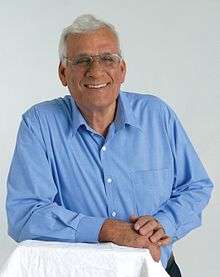 |
Haim Oron | 2008 | 2012 |
| 5 | 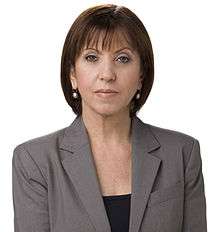 |
Zahava Gal-On | 2012 | 2018 |
| 6 | 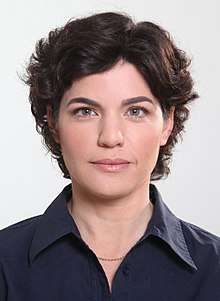 |
Tamar Zandberg | 2018 | 2019 |
| 7 | 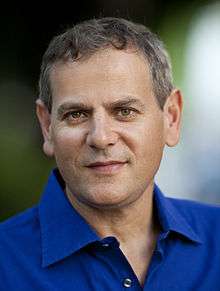 |
Nitzan Horowitz | 2019 | Incumbent |
Election results
| Election | Leader | Votes | % | Position | Seats | +/– | Status |
|---|---|---|---|---|---|---|---|
| 1992 | Shulamit Aloni | 250,667 | 9.58 | 12 / 120 |
Coalition government | ||
| 1996 | Yossi Sarid | 226,275 | 7.41 | 9 / 120 |
Opposition | ||
| 1999 | Yossi Sarid | 253,525 | 7.66 | 10 / 120 |
Coalition government (1999–2000) | ||
| Opposition (2000–2003) | |||||||
| 2003 | Yossi Sarid | 164,122 | 5.21 | 6 / 120 |
Opposition | ||
| 2006 | Yossi Beilin | 118,302 | 3.77 | 5 / 120 |
Opposition | ||
| 2009 | Haim Oron | 99,611 | 2.95 | 3 / 120 |
Opposition | ||
| 2013 | Zehava Gal-On | 172,403 | 4.55 | 6 / 120 |
Opposition | ||
| 2015 | Zehava Gal-On | 165,529 | 3.93 | 5 / 120 |
Opposition | ||
| April 2019 | Tamar Zandberg | 156,473 | 3.63 | 4 / 120 |
Snap election | ||
| September 2019 | Nitzan Horowitz | Part of the Democratic Union | 3 / 120 |
Snap election | |||
| 2020 | Nitzan Horowitz | Part of Labor-Gesher-Meretz | 3 / 120 |
Opposition | |||
Knesset members
Meretz supporters abroad
A number of left-wing Zionist organizations that share many of the ideas of Meretz are affiliated with the Israel-based World Union of Meretz; this includes the London-based Meretz UK, France's Cercle Bernard Lazare and the USA's Partners for Progressive Israel. The World Union of Meretz has representation in a number of organizations, such as the World Zionist Organization and the Jewish National Fund.
Hashomer Hatzair, a progressive Zionist youth movement with branches in many countries, is informally associated with Meretz, although it had been affiliated with Mapam, historically.
American Jewish comedian Sarah Silverman, whose sister Susan moved from the US to Israel and is a Reform rabbi there, asked Israeli voters to choose Meretz in the 2015 election.[41][42]
References
- Ronit Chacham (2003). Breaking Ranks: Refusing to Serve in the West Bank and Gaza Strip. Other Press, LLC. p. 60. ISBN 978-1-59051-099-5.
- "Meretz - parties". The Israel Democracy Institute.
- Gideon Doron; Michael Harris (2000). Public Policy and Electoral Reform: The Case of Israel. Lexington Books. p. 82. ISBN 978-0-7391-0134-6. Retrieved 16 June 2015.
- Ishaan Tharoor (14 March 2015). "A guide to the political parties battling for Israel's future". The Washington Post. Retrieved 28 June 2015.
- Gil Hoffman (5 March 2018). "Leading Meretz candidate: I want to be Diaspora's voice". The Jerusalem Post. Retrieved 17 September 2019.
- Peter Lamb (2015). Historical Dictionary of Socialism. Rowman & Littlefield. p. 312. Retrieved 30 July 2018.
- Melanie J. Wright (2013). Studying Judaism: The Critical Issues. A&C Black. p. 49. ISBN 978-1-4725-3888-8. Retrieved 16 June 2015.
- "Guide to Israel's political parties". BBC News. 21 January 2013. Retrieved 28 June 2015.
- Thomas Vescovi (6 June 2019). "Is the Israeli left doomed to marginalisation?". Middle East Eye.
- Shmeul Sandler; Manfred Gerstenfeld; Jonathan Rynhold, eds. (2013). "Appendices". Israel at the Polls 2006. Routledge. p. 281. ISBN 978-1-317-96992-1.
- Itamar Rabinovich (2009). Waging Peace: Israel and the Arabs, 1948–2003. Princeton University Press. p. 147. ISBN 1-4008-2597-0. Retrieved 16 June 2015.
- "Members". Party of European Socialists (PES). Archived from the original on 24 July 2015. Retrieved 16 June 2015.
- "Participants". Progressive Alliance. Retrieved 16 June 2015.
- "Member Parties of the Socialist International". Socialist International. Retrieved 16 June 2015.
- Meretz (Vigour) Times of Israel
- "Meretz". Ynetnews. 4 February 2008. Retrieved 16 June 2015.
- "Openly Gay Knesset Member Ripples the Establishment". Northern California Jewish Bulletin. 11 October 2002. Retrieved 16 June 2015.
- Somfalvi, Attila (19 March 2008). "MK Oron voted new Meretz chairman". Ynetnews. Retrieved 16 June 2015.
- Senyor, Eli (22 December 2008). "Meretz finalizes union with new leftist movement". Ynetnews. Retrieved 23 December 2008.
- Senyor, Eli (12 February 2009). "Meretz chief: Women's groups support of Livni harmed us". Ynetnews. Retrieved 7 December 2012.
- "גלאון: "זה בוקר קשה עבורי"" [Gal-On: "It's a difficult morning for me"] (in Hebrew). Channel 2 News. Retrieved 19 May 2012.
- פרידה בדמעות מג'ומס: "אחד הפרלמנטרים הבולטים שעיצבו את הכנסת" [Farewell tears of Oron: "One of the most prominent parliamentarians who shaped the Knesset"] (in Hebrew). Knesset. 23 March 2011. Archived from the original on 21 September 2011. Retrieved 19 May 2012.CS1 maint: BOT: original-url status unknown (link)
- Hoffman, Gil (28 December 2011). "Young activist joins Meretz leadership race". The Jerusalem Post. Retrieved 15 June 2015.
- "Elections in Israel January 2013". Israel Ministry of Foreign Affairs. Retrieved 16 June 2015.
- "Meretz and Labor sign vote-sharing agreement". The Jerusalem Post. 8 December 2014. Retrieved 16 June 2015.
- "Meretz primary puts incumbent MKs on top of Knesset slate". Haaretz. 20 January 2015. Retrieved 16 June 2015.
- Lahav Harkov (18 March 2015). "Meretz chief Gal-On to resign in wake of party's poor showing in election". The Jerusalem Post. Retrieved 18 March 2015.
- "Meretz wins 5th seat in absentee ballots, Likud secures 30th seat". Ynetnews. 19 March 2015. Retrieved 19 March 2015.
- "Gal-On decides not to quit as Meretz chief after party rises to 5 mandates in final count". The Jerusalem Post. 19 March 2015. Retrieved 19 March 2015.
- "LIVE BLOG: Final vote tally gives Likud, Meretz extra Knesset seats". Haaretz. 19 March 2015. Retrieved 19 March 2015.
- Wootliff, Raoul. "With huge turnout in first primary, Meretz voters pick veteran MKs for top spots". www.timesofisrael.com. Retrieved 16 February 2019.
- Holmes, Oliver (25 July 2019). "Barak forges leftwing alliance in bid to end Netanyahu's reign". The Guardian.
- Staff writer (29 July 2019). "Meretz central committee approves merger with Barak's Israel Democratic Party". The Times of Israel. Retrieved 17 September 2019.
- Weapons Can't Be Green, Haaretz, 19 May 2008. "'The main problems occupying most party representatives are too much traffic and air pollution, producing electricity from renewable sources, and waste management', says Hadas Shachnai of the Green Party, who represented Israel along with Mosi Raz of Meretz and environmental activist Eran Binyamini."
- Attila Somfalvi (19 September 2008). "Livni reaches out to Meretz". Ynetnews. Retrieved 16 June 2015.
- Nissan Ratzlav-Katz (25 December 2008). "UN Condemns Hamas; Meretz Wants Military Action". Arutz Sheva. Retrieved 16 June 2015.
- "Ultra Left Meretz Party Decimated". CBN News. 11 February 2009. Retrieved 16 June 2015.
- Etgar Lefkovits (21 September 2008). "Egged removes political ads on 'haredization' of J'lem". The Jerusalem Post. Retrieved 16 June 2015.
- Ashraf Khalil (9 February 2009). "Livni going after far left, women before Israeli vote". The Seattle Times. Associated Press. Retrieved 16 June 2015.
- Rudoren, Jodi (24 January 2014). "Shulamit Aloni, Outspoken Israeli Lawmaker, Dies at 86". The New York Times. Retrieved 21 April 2018.
- Lahav Harkov (11 March 2015). "Sarah Silverman endorses Meretz". The Jerusalem Post. Retrieved 16 June 2015.
- Sarah Silverman (11 March 2015). "Israel!". Twitter. Retrieved 16 June 2015.
External links
| Wikimedia Commons has media related to Meretz. |
- Official website (in Hebrew)
- English portal of official website
- Meretz on Facebook (in Hebrew)
- Meretz's channel on YouTube (in Hebrew)
- Meretz on Twitter

- Knesset Websites: Meretz (12–15th Knesset), Meretz-Democratic Choice-Shahar (16th Knesset), Meretz-Yahad (17th Knesset), New Movement-Meretz (18th Knesset)